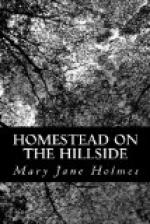One thing more about Rice Corner, and then, honor bright, I’ll finish the preface and go on with the story. I must tell you about the old schoolhouse, and the road which led to it. This last wound around a long hill, and was skirted on either side with tall trees, flowering dogwood, blackberry bushes, and frost grapevines. Half-way down the hill, and under one of the tallest walnut trees, was a little hollow, where dwelt the goblin with which nurses, housemaids, hired men, and older sisters were wont to frighten refractory children into quietness. It was the grave of an old negro. Alas! that to his last resting-place the curse should follow him! Had it been a white person who rested there, not half so fearful would have been the spot; now, however, it was “the old nigger hole”—a place to run by if by accident you were caught out after dark—a place to be threatened with if you cried in the night and wanted the candle lighted—a landmark where to stop when going part way home with the little girl who had been to visit you, and who, on leaving you, ran no less swiftly than you yourself did, half-fearing that the dusky form in the holly would rise and try his skill at running. Verily, my heart has beat faster at the thoughts of that dead negro than it ever has since at the sight of a hundred live specimens, “’way down south on the old plantation.”
The old schoolhouse, too, had its advantages and its disadvantages; of the latter, one was that there, both summer and winter, but more especially during the last-mentioned season, all the rude boys in the place thought they had a perfect right to congregate and annoy the girls in every possible way. But never mind, not a few wry faces we made at them, and not a few “blockheads” we pinned to their backs! Oh! I’ve had rare times in that old house and have seen rare sights, too, to say nothing of the fights which occasionally occurred. In these last brother Joe generally took the lead of one party, while Jim Brown commanded the other. Dire was the confusion which reigned at such times. Books were hurled from side to side. Then followed in quick succession shovel, tongs, poker, water cup, water pail, water and all; and to cap the climax, Jim Brown once seized the large iron pan, which stood upon the stove, half-filled with hot water, and hurled it in the midst of the enemy. Luckily nobody was killed, and but few wounded.
Years in their rapid flight have rolled away since then, and he, my brother, is sleeping alone on the wild shore of California.
“For scarcely had the
sad tones died
Which echoed the
farewell,
When o’er the western
prairies
There came a funeral
knell;
It said that he who went from
us,
While yet upon
his brow
The dew of youth was glistening,
Had passed to
heaven now.”
James Brown, too, is resting in the churchyard, near his own home, and ’neath his own native sky.




